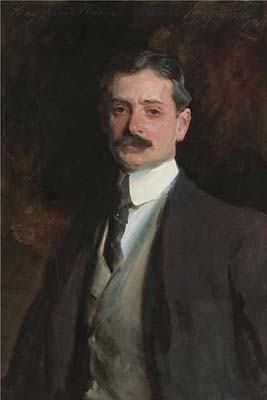
Railroad puts a Thorne in the healthcare supply chain
By Rick Dana Barlow
What does the railroad have to do with the healthcare supply chain?
As it turns out, plenty. Right down to its roots.
In fact, you can trace the earliest iteration, if not the authentic origination, of modern healthcare group purchasing to the mind of one man who, by and large, made his mark around the turn of the 20th century.

William Thorne
After graduating Phi Beta Kappa from Yale University in 1885, William Van Schoonhoven Thorne initially worked at the Great Northern Railway Co. for a while before railroad tycoon E. H. Harriman hired him as a purchasing assistant. Harriman already served as president of the Illinois Central until he gained control of Union Pacific Railway. Thorne then spent a short time as vice president and general manager of the Pennsylvania Coal Co., which was founded by his father Samuel, whose own father, Jonathan, was regarded as one of the chief developers of coal in the U.S. in the mid-19th century.
Deep down, however, Thorne was a railroad man, considered an expert in railroad efficiency, stemming largely through accounting and purchasing. He parlayed his influence and stature in the railroad industry into the hospital and healthcare industry as well, as his career paths overlapped a bit under the interwoven economic thread of accounting and purchasing.
Thorne became president of the Delaware Valley and Kingston Railroad Co., a railroad that extended 81 miles between Lackawaxen, PA, and Kingston, NY, as well as President of The Island Railroad Co., a small railroad that extended through Buffalo, NY, and vice president of the Erie & Wyoming Valley Railroad.
By 1903, Thorne returned to Harriman where he served as director of purchases at Union Pacific Railroad Co. and Harriman’s newly acquired Southern Pacific Railroad Co. from 1903-1913.
Cooperative buying debuts in healthcare
Through his extensive management and leadership experience in the railroad industry, Thorne felt that the railroad’s use of cooperative buying could help local hospitals in the New York metropolitan area become more operationally efficient.
As a result, Thorne authored the booklet, “A Central Purchasing Agency for the Hospitals of New York,” which he presented at a meeting of the Hospital Conference of the City of New York at the Academy of Medicine on April 9, 1909. His presentation articulated how the purchasing practices and pricing agreements he set up for the railway and steamship systems for which he served as a notable purchasing executive could be applied to and practical for New York City-based hospitals.
Within 12 months, Thorne used those purchasing principles, practices and pricing agreements as the blueprint and framework for a new business he decided to launch. He called it the Hospital Bureau of Standards and Supplies in New York.
His goal was to help the local metropolitan hospitals in New York City operate more efficiently. Thorne served as Treasurer and Member of the Board of Managers of The Presbyterian Hospital, New York; Chairman of the Executive Committee and Member of the Board of Governors, The Women’s Hospital, New York, and Member of the Board of Directors of the Manhattan Maternity and Dispensary, from 1896 until his death in February 1920.
Little did Thorne realize at the time that his newest business would perhaps become his most endearing and renowned legacy. The Hospital Bureau, founded in March 1910, widely would be regarded as the nation’s first group purchasing organization (GPO). As one of the most prominent and dominant forces in group purchasing for the next five decades, Hospital Bureau motivated the formation and emergence of many local and regional competitors, which spurred the development of state purchasing agencies as well as the growth through mergers and acquisitions of national GPOs of the present.
The book, “Principles of Government Purchasing,” reprinted his monograph. Thorne also authored “Hospital Accounting and Statistics,” with its 4th Edition published in 1918 by E.P. Dutton & Co., New York. Copies could be purchased then at $1.50 each. The book can be found here: https://archive.org/details/hospitalaccounti00thor.
The power of three
Thorne tapped into three different industries starting in the late 19th century – coal, railroad and healthcare. His contributions to each, which included accounting, management and purchasing, benefited investors, workers, customers and patients alike. Based on this extensive repertoire he has been called the “father of cooperative buying,” the forerunner to group purchasing in healthcare.
Thorne’s Hospital Bureau served as the model for future cooperative buying programs that sprouted in New York, Philadelphia, Cleveland and Chicago, for example. In its first annual report for the year ended Sept. 30, 1910, Hospital Bureau attracted 14 of the largest hospitals in New York to pool their collective buying power, access Hospital Bureau contracts and implement its purchasing standards.
Five years later, Hospital Bureau had 33 hospital and charitable institution members using its 68 agreements for commodity purchasing.
Following Thorne’s death in February 1920, just a month shy of Hospital Bureau’s 10th anniversary, Presbyterian Hospital President William Sloan remembered Thorne’s immeasurably valuable contributions to Presbyterian and to other leading hospitals around the country in Presbyterian’s 51st Annual Report. Sloan noted how Thorne “exercised great vigilance over the expenditures of the Hospital.
“The standardization of hospital accounting systems of leading hospitals throughout the country was devised by Mr. Thorne. He was also the founder of the Hospital Bureau of Standards and Supplies, which has proved an important factor in reducing the cost of administration.”
Furthermore, Sloan noted that Thorne’s work “had rendered to the Private Hospitals in this City a most valuable service by his establishing the Bureau of Hospital Standards and Supplies, and be devising a uniform method of Hospital Accounting.”
Thorne was inducted into Bellwether League Foundation’s Hall of Fame for Healthcare Supply Chain Leadership during its 10th anniversary as an honoree in the Bellwether Class of 2017.